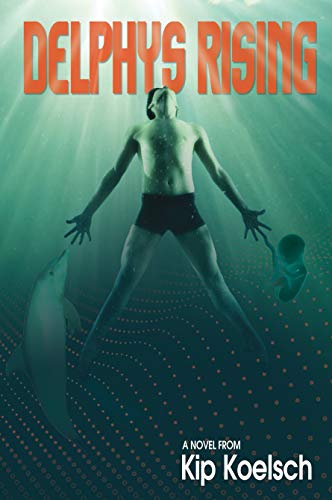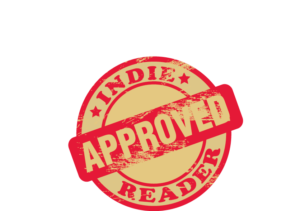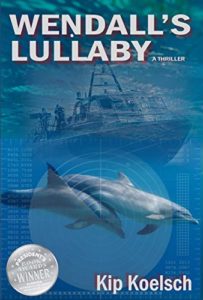Delphys Rising received a 4+ star review, making it an IndieReader Approved title.
Following find an interview with author Kip Koelsch.
What is the name of the book and when was it published?
Delphys Rising. Published on March 3, 2019
What’s the book’s first line?
“Evan!” Dr. Aldo Menke shouted at the dripping, naked figure tentatively emerging from the dark portal of a rust-stained isolation tank.
What’s the book about? Give us the “pitch”.
FOR MILLENNIA HUMANS HAVE DREAMED OF SPEAKING WITH DOLPHINS AND FAILED. UNTIL NOW. UNTIL DELPHYS.
In 2008 a young genius conceived Delphys—an innovative dolphin communication project—while submerged in the warm, salt water of a sensory deprivation tank and dark introversion of a forced separation from the woman he loved.
Nearly ten years after that epiphany—and after years of focused research, design and construction on an isolated Pacific atoll—that genius has embraced his new identity and become Dr. Evan McMillon–finally leaving the past behind. He has even found love again.
Now his Delphys team is poised to boot up their powerful artificial intelligence, initiate the world’s first contact with dolphins and ultimately transform that conversation into something much more ambitious—a covert operation that will surprise the project’s military backers and the world.
But when Dr. McMillon loses control of that ground-breaking conversation, he discovers toxic tendrils from his past infiltrating the very core of Delphys and wrapped around his heart. He also learns of the product of one passionate memory that may be the key to regaining control and completing his ambitious plan to change the world.
What inspired you to write the book? A particular person? An event?
When I had finished and self-published my first novel, Wendall’s Lullaby, I found some old notes for a potential sequel. After a few days of rest (and promoting my new book), I started brainstorming. In my mind, Wendall’s Lullaby was a very realistic thriller—I didn’t overly stretch truth into fiction. I wanted to take Delphys Rising further—more into the realm of speculative, near-future fiction. I also wanted to weave some of my thoughts on dolphin conservation and humanity’s environmental impact on the world into the plot. Some of the thoughts that lead me down the path I took with the narrative were: What would dolphins say to the world if they were given the opportunity? What would they DO if given the opportunity to act in a way that could impact humanity’s relationship to the marine environment?
What’s the main reason someone should really read this book?
It’s an entertaining read that might also have them thinking about humanity’s place in the world.
What’s the most distinctive thing about the main character?
He’s assumed and embraced a new identity—and its inherent confidence and gravitas.
Who-real or fictional-would you say the character reminds you of?
Carl Sagan—if he had been a marine biologist.
If they made your book into a movie, who would you like to see play the main character(s)?
Maybe Adam Driver as Dr. Evan McMillon and Natalie Portman as Rain. All of the dolphins would have to be computer generated to fit with my ethics about using trained/captive dolphins—that is non-negotiable.
When did you first decide to become an author?
I wrote my first “books” in Mrs. Cook’s second grade class. They were hand-written with crayons, illustrated by tracing the shapes of my cartoon character pencil erasers and stapled together with construction paper covers. In junior high and high school I did some short story writing and created a series of limited edition comic books. My senior year I wrote, drew and ran the offset press to print my last comic book. So, I was a self-publisher from the beginning. In 2007 I had the idea for my first novel, Wendall’s Lullaby, and had some interest from agents. It was 98% completed when I stopped pursuing it—life changes (job, divorce, etc) sidetracked me for a while. When I picked it up and self-published in 2017, I knew that I had more stories in me and that I wanted to be an author. With notes I had made in 2010, I started writing Delphys Rising.
Is this the first book you’ve written?
This is my second self-published novel. My first was the epic conspiracy thriller, Wendall’s Lullaby.
What do you do for work when you’re not writing?
Currently, I run a small business that puts on local trail running and triathlon events. I’m looking for a part-time job to help carry me through to the time when my writing generates more than just a little supplement to my income.
How much time do you generally spend on your writing?
My office is at home. Depending on my other business and household duties, I write anywhere from one to three hours a day—sometimes more if I’m particularly in the groove. I try to write, research or do some brainstorming every day.
What’s the best and the hardest part of being an indie?
Hardest: Book marketing—getting your work in front of readers and (to a lesser extent) editorial reviewers.
Best: nearly full creative control. Of course there are times when I’ll bow to the suggestions of my editors, beta readers, cover designer and my wife, but overall the creative buck stops with me.
What’s a great piece of advice that you can share with fellow indie authors?
Writing and publishing your book is just the beginning and maybe the easiest part of being an author. The most challenging part of the ride is getting your book in front of readers. As an indie you can’t shy from self-promotion and investing wisely in your marketing.
Would you go traditional if a publisher came calling? If so, why?
That’s something that I would have to weigh quite seriously. Much would depend on the work they were interested in, the contract terms and what they would do to promote the book. The industry has changed so much since I started my first book back in 2007. At that time I would have jumped at getting a contract with a traditional publisher. But in 2019, after being exposed more intimately to the industry for two years, I don’t see a huge difference between traditional publishing and self-publishing. Unless you are looking at a sure-thing, best-seller, most traditional publishers are still going to put much of the promotional burden on the authors—and without the authors having the freedom to promote as they see fit.
Is there something in particular that motivates you (fame? fortune?)
I have stories in my head that need to get out. I have a way of seeing people, the world and their relationship to each other that I want to share. And, I’d like to make a comfortable living. For me—simple guy, wife and three cats—that would be $25,000 a year from my writing. So I’d like my writing to feed my creative and financial needs.
Which writer, living or dead, do you most admire?
Of course there are many, but I really admire the work of Neal Stephenson. He’s not afraid to write big books that weave complex stories. He challenges me as a reader and I love that.


